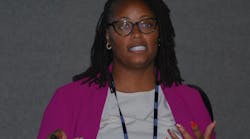Plastics recycling has been around for decades, but that doesn’t mean it can’t be improved. An eight-year-old company, PureCycle Technologies, has made it its mission to do exactly that, and it’s received a big assist from an Emerson DeltaV control system and other Emerson technologies to develop not just a smart plant but what the company refers to as a “smartest” plant as production ramps up around the globe.
PureCycle was founded in 2015 in Ironton, Ohio, and developed a unique purification process to transform polypropylene plastic into a versatile, replenishable resource. Its process lets recycled plastic be reused multiple times, whereas traditional recycling is limited in scope. While people around the world use polypropylene every day, most of it goes unrecycled and much of it ends up in the oceans. PureCycle’s patented process separates color, odor and other contaminants from plastic waste to transform it into ultra-pure recycled resin. This process helps close the loop on plastic waste while making recycled plastics more accessible at scale.
But as a young company on a fast track to growth and with little time to waste while attacking a rapidly growing worldwide problem, it’s had to be creative while planning for new facilities. As Ronetta Bagby, senior automation engineer with PureCycle, told an audience during this week’s Emerson Exchange Immerse conference, “We don’t have time for a digital transformation. We must be born digital.”
For the company, that means it must be ready to rapidly scale its operations. So, as it grows to include additional facilities in the U.S. and internationally, it must move beyond traditional smart facility standards and take it one step further, and faster.
Being “born digital” means its plants must not only be built with traditional qualities, such as integrated control and safety systems, process historians and condition monitoring, but also advanced attributes, such as design for mobility, a sound alarm management philosophy, predictive analytics, simulation models and digital twins.
Bagby pointed to the need to accommodate remote workers and cybersecurity measures as requirements for plants that go beyond traditional digitalization efforts. In short, the new plants must be future-ready, even though no one can be sure what the future holds.
The whole purpose of the born digital program is to make sure the company is providing its operators, company and the organization with a system that will self-diagnose, solicit help when it needs it, and eventually, help build itself using emerging technologies such as artificial intelligence, according to Bagby.
One of the enablers of PureCycle’s efforts is Emerson’s DeltaV automation system, which is designed to simplify operational complexity and lower project risk. The Emerson products and services increase plant performance with intelligent control that is easy to operate and maintain, Bagby said.
Virtualization meets remote access
PureCycle has 13 workstations on its Ironton, Ohio, production unit, and with traditional methods each workstation would need a server, power and cabinet space—and for all of that to be connected. But with virtualization, up to 40 machines can run on a single host, Bagby said. “That gives us redundancy,” she added. “If one of our virtual machines fails, it automatically switches to another host. We see minimal downtime.”
She also pointed to time and cost savings during commissioning, as each virtual machine can be stood up in about an hour. Most important is the fact that virtualization gives the company the ability to quickly scale up its process when it is ready, without interrupting production. PureCycle also takes advantage of electronic marshalling to connect its field devices to DeltaV. This cuts cabling costs as well as increasing flexibility and redundancy, Bagby said.
Bagby also pointed to the changing nature of the industry workforce, particularly post-COVID. None of her team lives in Ironton, so the company had to stand up a secure, third-party network that not only allows them to communicate with more than 50 devices across its network, but also allows remote access for all its engineering department, operations, and external business and supplemental organizations.
The company also hosts its electrical system data on DeltaV Mobile, a read-only platform that allows managers, engineers and operators to access operational data whenever they need it. “It lets us view our electrical usage and remotely troubleshoot electrical equipment that’s running in our facility,” Bagby said.
It’s another step toward creating that “smartest” plant the company values, and it’s another step toward expanding adoption of the company’s innovative recycling methods around the world.



